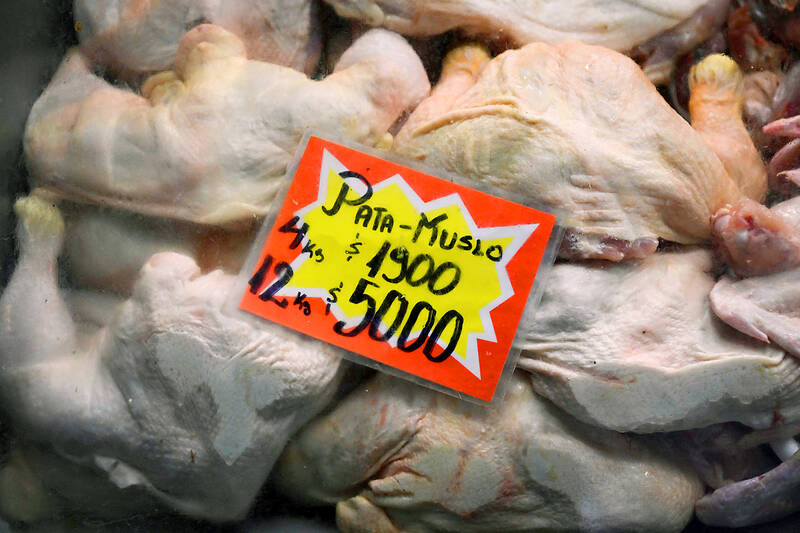Brazil, the world’s top chicken exporter, has for the first time confirmed highly pathogenic avian influenza (HPAI) cases, but only in wild birds, the Brazilian Ministry of Agriculture and Livestock said on Monday.
Two cases were detected in wild birds and should not trigger a ban on imports of Brazilian poultry products as per guidelines from the World Organisation for Animal Health (WOAH), the Brazilian government said.
The avian influenza virus can kill entire flocks of birds and cause losses for the farming sector. Brazil’s chicken exports rose 27 percent last year to US$9.76 billion, as other countries reeled from a global outbreak of the virus, yet the South American country had never registered a case until now.

Photo: AFP
The Brazilian government confirmed the detection of the H5N1 subtype of the influenza virus in two marine birds, of the Thalasseus acuflavidus species, on the coast of the southeastern state of Espirito Santo.
Brazil’s main poultry-producing states are in the far south and center-west. However, Espirito Santo is Brazil’s third-largest egg producing state, meat lobby ABPA said. It does not export eggs, but sells them in the domestic market.
Epidemiological surveillance services are to be intensified to detect potential cases in wild and commercial animals in the area close to where the cases were confirmed, a government source said.
The ministry said that because the cases were detected in wild animals, Brazil’s status “as a country free of HPAI” was not affected.
Miguel Gularte, CEO of Brazil-based BRF, the world’s largest chicken exporting company, told a news conference he was not surprised by the case of highly pathogenic avian influenza, adding that the company was prepared for any scenario.
He reiterated WOAH’s recommendations that no members of that organization would impose import bans, because of cases detected in wild animals.
He added that the company relies on Brazil’s “robust” animal health services to prevent and contain any potential threats to industrial poultry farms.
The main importers of Brazil’s chicken products last month included China, Japan, South Africa and Saudi Arabia.
China has banned imports of poultry from nearly 40 US states due to outbreaks of bird flu on commercial poultry farms.
Argentina suspended its poultry exports in late February after recording the first case of bird flu in its poultry industry in southern Rio Negro province, but resumed exports from bird flu free areas in late March.
A record number of chicken, turkeys and other birds have died in outbreaks in the US, Europe and Britain, and the virus is spreading in South America, Africa and Asia.
Losses of poultry flocks have contributed to record-high prices for eggs and turkey meat in some places.
While humans can contract H5N1, cases remain very rare, and global health officials have said the risk to humans is low.

Airlines in Australia, Hong Kong, India, Malaysia and Singapore yesterday canceled flights to and from the Indonesian island of Bali, after a nearby volcano catapulted an ash tower into the sky. Australia’s Jetstar, Qantas and Virgin Australia all grounded flights after Mount Lewotobi Laki-Laki on Flores island spewed a 9km tower a day earlier. Malaysia Airlines, AirAsia, India’s IndiGo and Singapore’s Scoot also listed flights as canceled. “Volcanic ash poses a significant threat to safe operations of the aircraft in the vicinity of volcanic clouds,” AirAsia said as it announced several cancelations. Multiple eruptions from the 1,703m twin-peaked volcano in

Farmer Liu Bingyong used to make a tidy profit selling milk but is now leaking cash — hit by a dairy sector crisis that embodies several of China’s economic woes. Milk is not a traditional mainstay of Chinese diets, but the Chinese government has long pushed people to drink more, citing its health benefits. The country has expanded its dairy production capacity and imported vast numbers of cattle in recent years as Beijing pursues food self-sufficiency. However, chronically low consumption has left the market sloshing with unwanted milk — driving down prices and pushing farmers to the brink — while

‘SIGNS OF ESCALATION’: Russian forces have been aiming to capture Ukraine’s eastern Donbas province and have been capturing new villages as they move toward Pokrovsk Ukrainian Commander-in-Chief Oleksandr Syrskyi on Saturday said that Ukraine faced increasing difficulties in its fight against Moscow’s invasion as Russian forces advance and North Korean troops prepare to join the Kremlin’s campaign. Syrskyi, relating comments he made to a top US general, said outnumbered Ukrainian forces faced Russian attacks in key sectors of the more than two-and-a-half-year-old war with Russia. Ukrainian President Volodymyr Zelenskiy in a nightly address said that Ukraine’s military command was focused on defending around the town of Kurakhove — a target of Russia’s advances along with Pokrovsk, a logistical hub to the north. He decried strikes

China has built a land-based prototype nuclear reactor for a large surface warship, in the clearest sign yet Beijing is advancing toward producing the nation’s first nuclear-powered aircraft carrier, according to a new analysis of satellite imagery and Chinese government documents provided to The Associated Press. There have long been rumors that China is planning to build a nuclear-powered aircraft carrier, but the research by the Middlebury Institute of International Studies in California is the first to confirm it is working on a nuclear-powered propulsion system for a carrier-sized surface warship. Why is China’s pursuit of nuclear-powered carriers significant? China’s navy is already